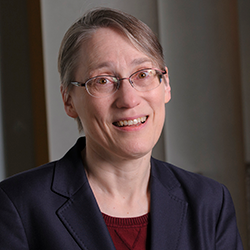Joy Wiltenburg, Ph.D.
Joy Wiltenburg, Ph.D.
Joy Deborah Wiltenburg, Ph.D.
Professor Emerita
Biography
Joy Wiltenburg is a specialist in the social and cultural history of early modern Europe. She is especially interested in the construction and operation of social power, which has led her to research projects on gender, popular literature, and crime, as well as her current focus on the social functions of laughter. She has published three books and is working on a fourth, in addition to publication of articles in journals including The American Historical Review and Renaissance Quarterly. She completed her Ph.D. at the University of Virginia and has taught at Rowan University since 1991.
Courses taught: Dr. Wiltenburg teaches courses in early modern Europe, including the Renaissance and Reformation (15th-17th centuries) and Age of Enlightenment (17th-18th centuries), as well as courses on European women's history. Her courses on more specialized topics include Witch Hunting in Early Modern Europe and History of Crime. She also teaches Western Civilization, Historical Methods, and the capstone Seminar. Her Seminar courses focus on a broad common theme that can be applied to varied times and places, enabling students to build on their previous coursework. Past themes have included Propaganda, Violence and the Sacred, Ideology, and History of Emotions.
Research: Dr. Wiltenburg's most recent book, Crime and Culture in Early Modern Germany, was published by the University of Virginia Press in 2012. It examines the rise of sensationalist crime reporting, exploring the social and political implications of the public discourse of crime. Her first book, Disorderly Women and Female Power in the Street Literature of Early Modern England and Germany, was published in 1992. This comparative study used cheap printed literature as a window into attitudes toward gender and power. Women in Early Modern Germany: An Anthology of Popular Texts, published in 2002, is a collection of popular German verses and songs about women in the sixteenth and seventeenth centuries, translated into English verse. It makes these rare primary sources available to English-speaking audiences for the first time. Dr. Wiltenburg's research on these projects has been supported by fellowships from the National Endowment for the Humanities and the American Council of Learned Societies, among other sources.
Her current project on laughter draws on the evidence contained in diaries, letters, and court records, investigating laughter's role in relationships of power, status, and gender in early modern Europe. Publications from this project include “Soundings of Laughter in Early Modern England: Women, Men, and Everyday Uses of Humor,” in Early Modern Women: An Interdisciplinary Journal (2016) and “Early Modern Embodiments of Laughter: The Journal of Felix Platter,” in the collection Feelings Materialized: Emotions, Bodies, and Things in Modern Germany, published in 2020. The book manuscript in progress is currently titled “Laughing Histories: From the Renaissance Man to the Woman of Wit.”




